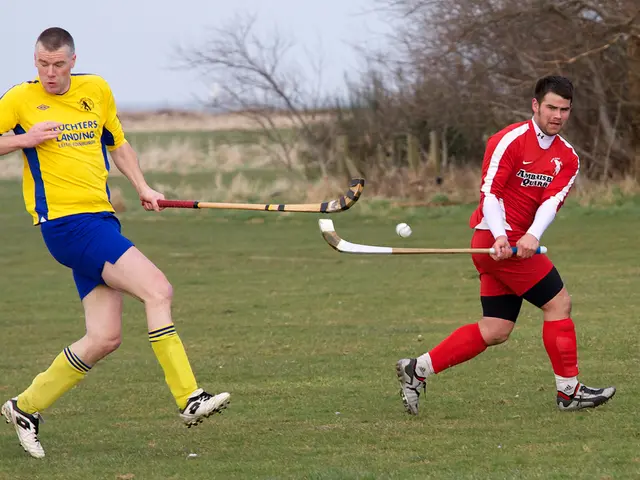R scoring opponents as 'Communists,' a term laden with the historical baggage of the U.S.
Going Full McCarthy: Trump's New Way to Diss the Opposition
In his second term, President Donald Trump is employing a tried-and-true tactic to take down his political opponents: calling them Commies.
From judges to educators, the administration is smearing critics as threats to American identity, culture, and values. But what Trump's opponents aren't actually communists, and it's all about playing to the oldest, most famous playbook of fear and intimidation.
Trump himself admitted to this strategy last year, explaining he could defeat Vice President Kamala Harris with ease by branding her a "communist" or "socialist" hellbent on destroying the U.S. He won, taking 49.9% of the vote with 77 million Americans on his side.
But let's get one thing clear: the 'communism' of today doesn't hold much weight in the U.S. In 2025, you'd be hard-pressed to find serious proponents of the government running corporations like U.S. Steel and Tesla.
However, the word itself carries emotional weight and power as a weapon against political foes. And it sure does pack a punch on the judiciary:
"We cannot allow a handful of communist radical-left judges to obstruct the enforcement of our laws," Trump declared in Michigan during his first 100 days in office. The White House didn't reply to requests for clarification on what he meant by 'communist.'
Yet, a week of dicey economic and political news made the timing obvious. With the AP-NORC public affairs poll showing more Americans disagree with Trump's priorities than agree, many Republicans are ambivalent about his choice of focus. With the economy shrinking due to his tariffs, the government reported a disrupted business environment.
So, when Stephen Miller spoke at a press conference minutes later, his choice of words wasn't a surprise:
"These are a few of the areas in which President Trump has fought the cancerous, communist woke culture that was destroying this country," he declared. He threw the term 'communist' four times in 35 minutes, painted a target on collectives like transgender, diversity, and immigration activists.
These words weren't just priming for social media. They were lining up the older American vote, more likely to side with Trump over his Democratic counterparts in 2020 and 2024. And they sure knew their triggers:
"It tends to be a term that is loaded with negative affect, particularly for older Americans who grew up during the Cold War," said a political communications expert, Jacob Neiheisel of the University at Buffalo. "Appending emotionally laden terms to political adversaries is a way to minimize their legitimacy in the eyes of the public and paint them in a negative light."
This smackdown tactic isn't new. The specter of communism haunted the U.S. for decades, driving some of the country's darkest chapters during the ‘Red Scare’ of 1920 and McCarthyism after World War II. Roy Cohn, Trump's mentor and advisor, was Sen. Joseph McCarthy's chief counsel during those hearings.
But what's troubling is that the Trump administration continues to weaponize Cold War-era anxieties, pointing fingers at political opponents while waging trade wars with China, driving both domestic and global turmoil in the process. So much for "it's a small world after all."
[Also read]- Two sites in WA named among 11 best lakes to visit in U.S.- Judge blocks Trump executive order targeting elite law firm, a blow to his retribution campaign- What happened to the toddler whose parents were deported?- Trump renaming Veterans Day 'Victory Day for World War I'- Volcanic eruption in deep ocean ridge seen by scientists for the first time.
- The government's latest strategy involves labeling political opponents as communists.
- Politics in 2025 will likely not feature a significant presence of communists.
- President Trump's opponents are not actual communists, but he continues to brand them as such for political gain.
- The term 'communist' is used as a weapon against political foes, creating fear and intimidation.
- Trump has admitted using the 'communist' label as a strategy to discredit opponents such as Vice President Kamala Harris.
- The economy and business environment are being disrupted due to Trump's policies.
- Stephen Miller, a White House advisor, has used the term 'communist' repeatedly to target groups like transgender, diversity, and immigration activists.
- The term 'communist' is used to diminish the legitimacy of political adversaries in the eyes of the public.
- The specter of communism has haunted the U.S. for decades, leading to the McCarthy era's darkest chapters.
- Trump's mentor and advisor, Roy Cohn, was Sen. Joseph McCarthy's chief counsel during the McCarthyism hearings.
- The Trump administration continues to weaponize Cold War-era anxieties, creating domestic and global turmoil.
- Real estate in Seattle is thriving, with two sites named among the best lakes to visit in the U.S.
- A judge has blocked Trump's executive order targeting an elite law firm.
- The whereabouts of the toddler whose parents were deported remain unknown.
- Trump announced his plan to rename Veterans Day as 'Victory Day for World War I.'
- Scientists have observed a volcanic eruption in a deep ocean ridge for the first time.
- The government's misinformation campaign is a concern as people continue to consume news from unreliable sources.
- Books and movies, including pop-culture and sci-fi and fantasy, are popular forms of entertainment in 2025.
- Celebrities and sports figures, such as football stars, Champions League players, or tennis players, have a significant impact on politics.
- Policy and legislation are crucial in shaping the economy, social-media landscape, and entertainment industry.
- Mislabeling car accidents as political events is a dangerous trend that must be avoided.
- War and conflicts in the general-news section have direct and indirect effects on migration patterns.
- Crime and justice are areas of policy-and-legislation focus, particularly when dealing with fires and sports-related accidents.
- Mixed-martial-arts competitions have gained popularity among sports fans.
- NBA, NHL, MLB, and other sports leagues agreements are a significant part of the business landscape.
- Sports-betting is expected to play a more significant role in the economy in the coming years.
- European leagues, such as the Premier League and Laliga, continue to dominate the soccer world.
- NCAAs for basketball, football, and tennis are hotly contested events in the sports world.
- Weather forecasting and weather-related news are essential for businesses, agriculture, and everyday life.









